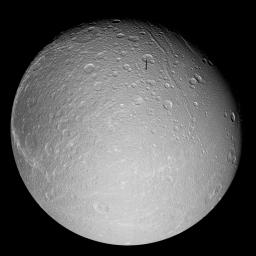The cratered and cracked disk of Saturn's moon Dione looms ahead in this mosaic of images taken by Cassini on Oct.11, 2005, as it neared its close encounter with the icy moon.
The images used for this mosaic are clear-filter views, which reveal a great deal of surface detail.
Multiple generations of tectonics can be seen in this full-disk view. Near the eastern limb (at the right) are tectonic fractures, which may be similar to the bright, braided canyons that make up Dione's noted wispy terrain. Some of the bright, wispy markings can be seen at the left.
The softer ridges and troughs at the upper right appear to be about the same age as the cratering seen in that region. These appear to be older than the fracturing seen in the wispy terrain and the fractures seen at the right.
Scientists continue to be intrigued by the strikingly linear features seen crisscrossing the southern latitudes. The fine latitudinal streaks appear to crosscut everything, and appear to be the youngest feature type in this region of Dione.
A large impact basin hugs the south polar region (at the bottom, right of center). Northeast of the basin is a region of terrain that is relatively smooth, compared to the rest of the moon.
This view of Dione is centered on 1.3 degrees south latitude, 167.6 degrees west longitude. For a false-color view see PIA07747.
The images in this mosaic were obtained with the Cassini spacecraft narrow-angle camera at distances ranging from of 55,280 to 27,180 kilometers (34,350 to 16,890 miles) from Dione. The full-size versions of the mosaics have an image scale of 316 meters (1,036 feet) per pixel.
The Cassini-Huygens mission is a cooperative project of NASA, the European Space Agency and the Italian Space Agency. The Jet Propulsion Laboratory, a division of the California Institute of Technology in Pasadena, manages the mission for NASA's Science Mission Directorate, Washington, D.C. The Cassini orbiter and its two onboard cameras were designed, developed and assembled at JPL. The imaging operations center is based at the Space Science Institute in Boulder, Colo.
For more information about the Cassini-Huygens mission visit http://saturn.jpl.nasa.gov. The Cassini imaging team homepage is at http://ciclops.org.

 Planetary Data System
Planetary Data System












